Cedar Valley’s winning ways continue as we are proud to announce that we recently garnered three 2019 American Concrete Pavement Association (ACPA) Excellence in Concrete Pavement awards. Amazingly, this brings our total winning ACPA projects to thirty-eight over the last fifteen years. CVC is one of an elite number of concrete pavers in the nation who can boast of this sustained level of paving excellence. Cedar Valley Corp. was the only national paver to win three awards this year.
The awards program encourages high-quality workmanship in concrete pavement projects, and serves as a way to share success regarding challenging and highly successful projects. Judges representing various stakeholder groups throughout the transportation-construction community evaluate projects. The program recognizes contractors, engineers, and project owners who completed outstanding projects.
ACPA presents both a gold and a silver award - but keeps the award level under wraps until their formal awards banquet which was held on the evening of December 5th in New Orleans, Louisiana.
Our winning projects are in the Reliever/General Aviation Airport category, where our Sioux County Regional Airport is a winner, and in the Divided Highways category, where Woodbury/Ida County US Highway 20 is a finalist. The third winner is our Floyd County T-26-Marble Rock project in the County Road category.
This is an incredible tribute to the quality projects that Cedar Valley’s crews build year after year. The Executive Summary for each of the three awards and a list of the winning salaried crew members.
Sioux County Regional Airport - Gold Award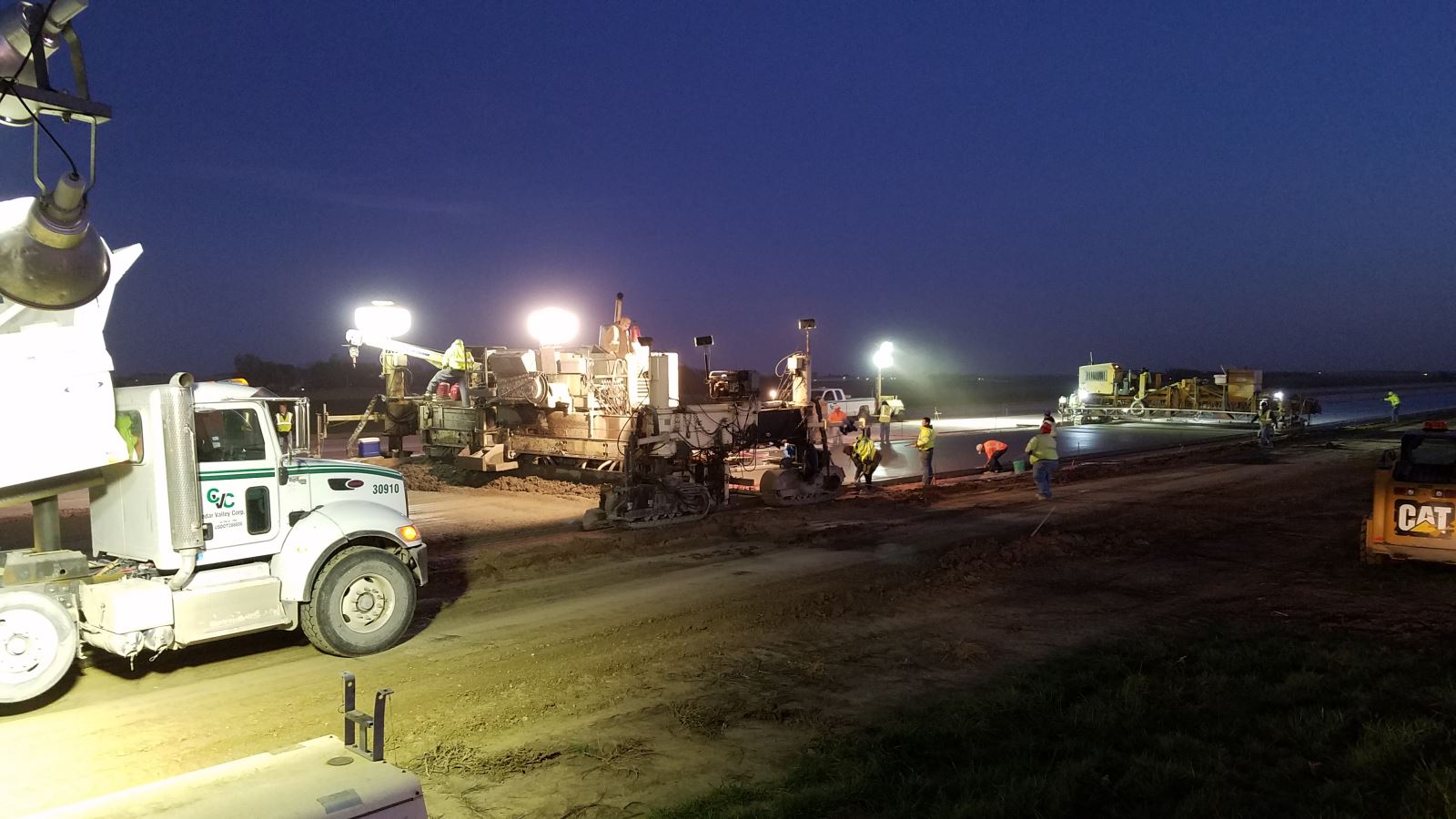
Cedar Valley Corp. won the Iowa Concrete Paving Association award for Best Reliever/General Aviation Airport for our Sioux County Regional Airport project in both 2017 and 2018. Based on a funding quirk by the Federal Aviation Administration, this concrete paving project was built under two different contracts separated by a year. However, Cedar Valley won the award for both projects. We chose not to submit the first project as the airport was only approximately one-half paved.
Brian D. Meyer, PE the Project Manager for DGR Engineering made these comments: The opportunity to be part of a team that developed a new airport out of an Iowa cornfield is a once-in-a-lifetime experience for an engineer (new airports just don’t happen much anymore). The rare partnership on this project between contractor, owner and engineer was an experience I will never forget and for which I am truly grateful. Frankly, I believe the partnership will stand as a model of what is possible in the airport construction industry.
What really made the project unique were the phasing challenges associated with a Federal Aviation Administration multi-year funding package. The main part of the new airport was built in three multi-year construction phases: Phase 1 Grading, Phase 2 Paving, and Phase 3 Paving. In the end the airport was constructed during 5 different construction seasons.
Cedar Valley’s two Sioux County Airport projects built a 5,500 lineal foot by 100 foot wide runway. The paving also included four taxi ways, a large apron area, and the concrete around two T-hangars. In all, CVC placed 122,532 square yards. Amazingly, because of horrible weather conditions in 2017 and 2018, our crews poured on 47 different days to complete these projects.
These two projects are really a “poster child” for what is wrong with the way the Federal Aviation Administration (FAA) funds projects in the Midwest. The first paving project, Phase 2, didn’t receive a Notice to Proceed (NTP) until August 15, 2016. On the second project, Phase 3, the Notice to Proceed wasn’t issued until August 3, 2017. Based on the FAA’s funding cycle and resulting award delays, both these projects missed out on the best construction months in Iowa and were forced to be built in the late fall and wet spring.
Fortunately Mother Nature was agreeable for once, and despite the late start we were able to pour the runaway and taxiway paving on Phase 2 during late October and early November in 2016. This left about 7,700 square yards of apron paving for 2017.
After we were the low bidder on the Phase 3 paving, the Sioux County Regional Airport manager and project engineer agreed that it only made sense to combine the remaining paving as long as the Phase 2 paving was completed in 2017 as scheduled. Obviously, a half built airport was of no use to anyone. However, no one could have anticipated the horrible weather year that lay ahead for this project.
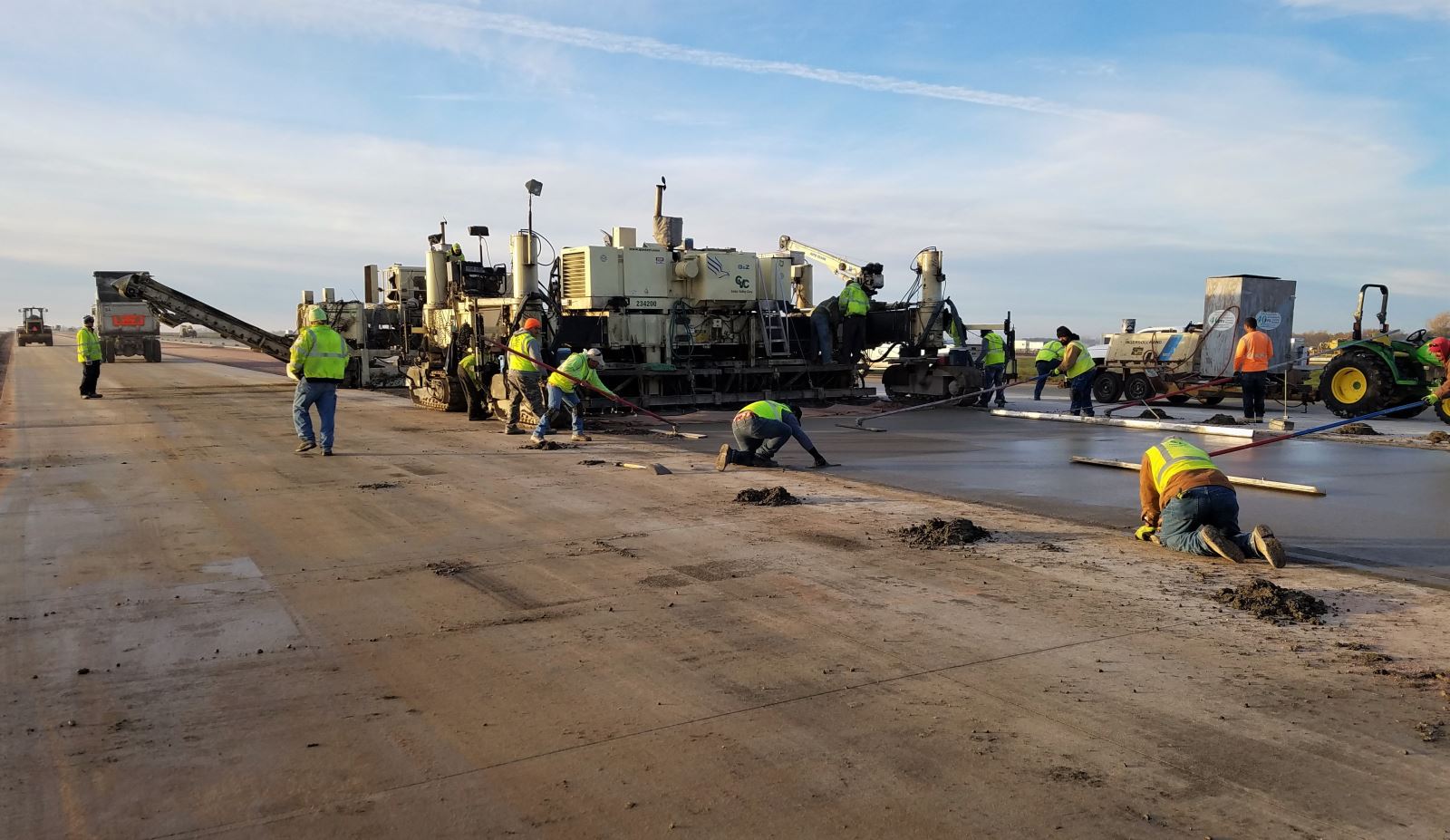 Although our subcontractors worked on Phase 2, Cedar Valley’s forces did not start on the required earth and base work until we received the NTP for Phase 3. Again, because of what we deem to be a bad FAA funding cycle for Iowa projects, we did not receive the go ahead until near the middle of August in 2017. Unfortunately we hit two straight weeks of unseasonably wet weather. Based on the extremely stringent FAA subgrade compaction specification and equally tough project inspection, we were subsequently unable to attain subgrade compaction. As hard as we tried, we never could find a long enough dry period to get the necessary compaction.
Although our subcontractors worked on Phase 2, Cedar Valley’s forces did not start on the required earth and base work until we received the NTP for Phase 3. Again, because of what we deem to be a bad FAA funding cycle for Iowa projects, we did not receive the go ahead until near the middle of August in 2017. Unfortunately we hit two straight weeks of unseasonably wet weather. Based on the extremely stringent FAA subgrade compaction specification and equally tough project inspection, we were subsequently unable to attain subgrade compaction. As hard as we tried, we never could find a long enough dry period to get the necessary compaction.
Thus we were facing a huge dilemma, based on our commitment to the owner to pave the airport apron in 2017. We determined that the only option open to us was to cement treat the base in order to reach compaction. The engineer agreed, as long as Cedar Valley footed the bill, and we moved forward with the project. Finally, on November 20th the apron paving was completed and our cold and exhausted crews went home for the year.
With Phase 2 completed as the snow began to fly, Phase 3 paving was bumped to the 2018 season. We thought we had put the airport weather woes behind us, but how wrong we were. After four snows and 18 inches of snow the following April, our planned paving start of April 2 was history. It took us the entire month of May, all the while fighting wet subgrade, to finally get grade passed and base placed. We finally made our first runway pour on June 12th. Ugly wet weather plagued the job from that point forward and we weren’t able to make our fourth and final runway pour until July 2nd. The weather was so bad that it took us until August 10 to complete the remaining 33,000 square yards of paving. It was not a good summer to live in Iowa!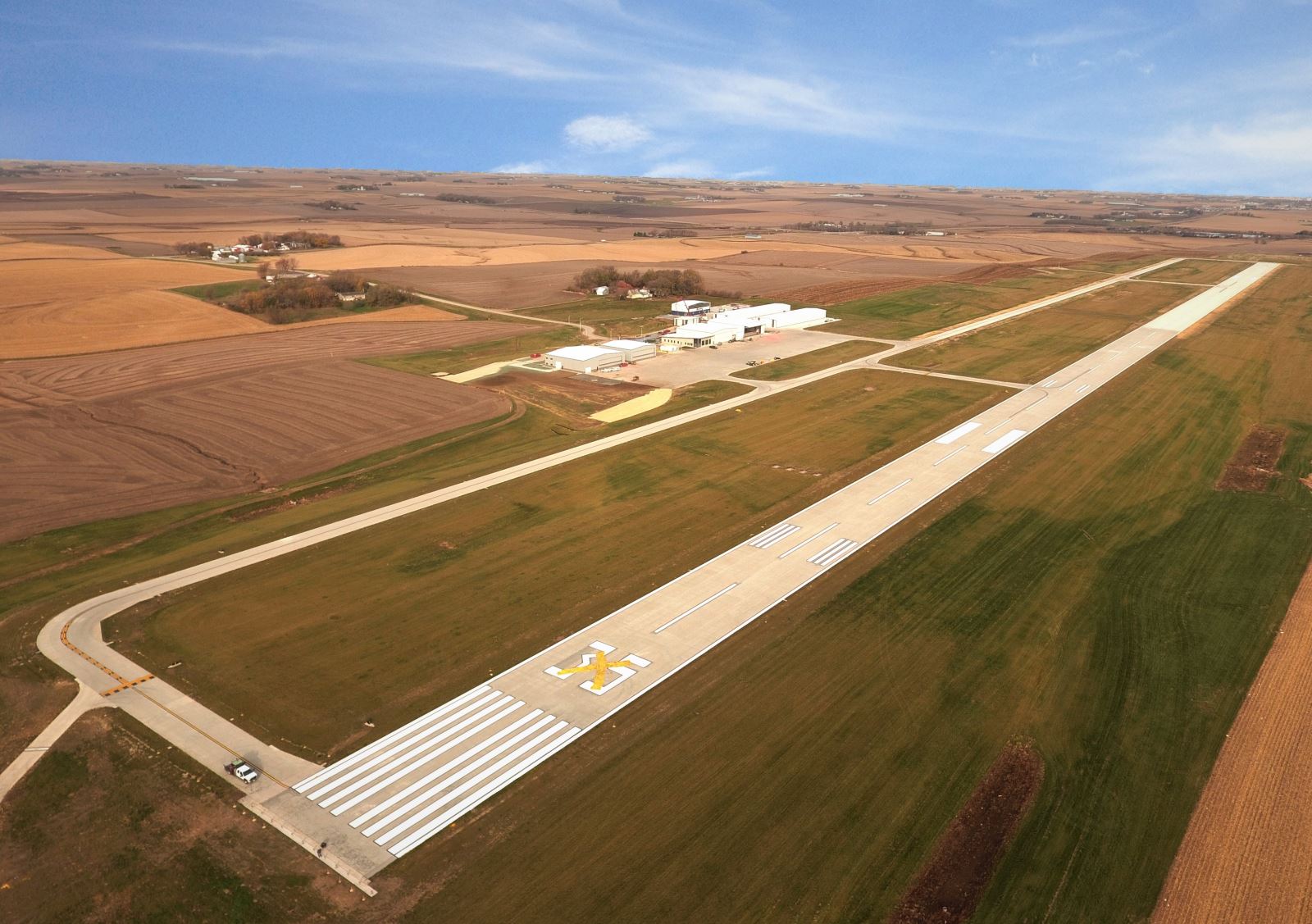
During all this time we were making every effort possible to expedite the project.
Although we were not allowed to use probes to determine concrete strength, Cedar Valley did take extra sets of beams which we then used to determine early strengths. The project specified a 28-day flexural strength of 650 psi, but thanks to the beams we were able to drill dowels at 350 psi, we were able to run a track of our paver on an adjacent slab at 400 psi, and had full construction access at 500 psi. The additional effort paid off.
It became obvious to everyone, especially Cedar Valley’s project management, that this project was taking a miserable toll on our superintendents, foremen, and hourly staff. Everyone could see the season slipping away as this job from hell simply could not get the weather breaks needed to be completed. It is a real testament to the professionalism of our employees that they stuck to it in mostly rain and a little shine and finished the project with flying colors despite the unbelievable weather setbacks thrown at them time and again.
In the end we met or exceeded all our quality goals and despite the difficult site conditions, we are extremely proud of our safety record on this project. We had no loss time injuries or recordable vehicular accidents with almost 47,000 man-hours of exposure.
Brian D. Meyer, PE the Project Manager for DGR Engineering nicely summed up Cedar Valley’s project efforts this way: The high quality of PCC paving was evident in spite of the extreme weather challenges that northwest Iowa experienced during this period. Excellent and consistent results across the board for pavement, smoothness, materials, testing results, pavement strength and joint quality. Quality was clearly important to CVC.
Project Manager Jason Hankins Paving Superintendent Cory Chew
Plant Superintendent Brian Ingram Project Superintendent Craig Silver
Plant foreman Richard Lee Fine Grade Foreman Barry Beeh
Concrete Foreman Kenny Hoenig Saw Seal Foreman Kandy Fox
Equipment Supervisor Bryce Halupnick Quality Control Supervisor/Truck Fleet Manager John Quandahl
Woodbury-IDA County US Highway 20 - Gold Award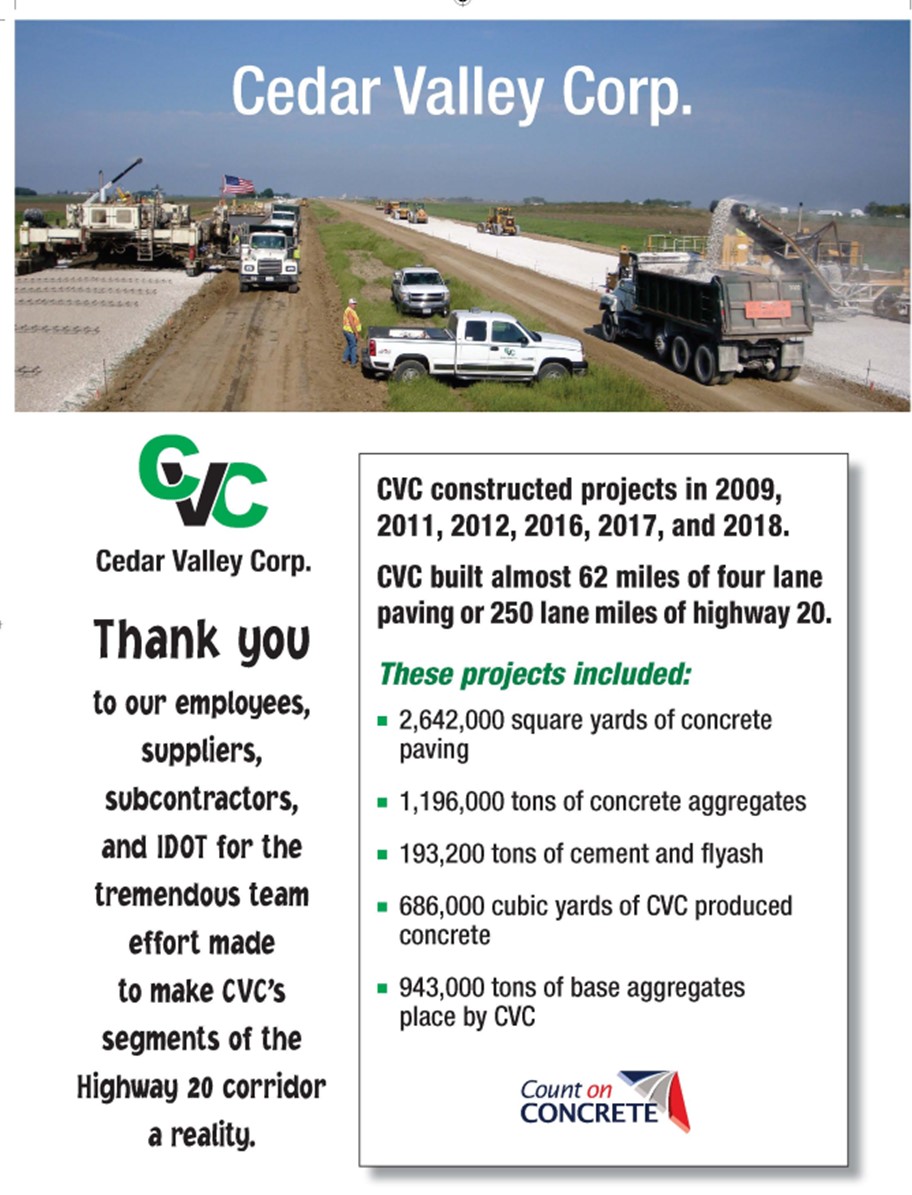
Cedar Valley Corp. (CVC)’s Woodbury/Ida County US Highway 20 subcontract won the Iowa Concrete Paving Association’s (ICPA) “Best “ award in the Divided Highways category, although odds were in our favor since 3 of the 5 nominees were CVC projects. This project built close to eleven miles of divided four lane paving and we were pleased to win first place in this prestigious category.
Cedar Valley’s project represented the final portion – the last of the six segments, built by 3 separate paving contractors, which would finally upgrade the entire Iowa Highway 20 corridor to a divided four lane pavement. The 40 miles of paving required 1,700,000 square yards of concrete paving. Of the total six segments contracted, which represented 1.7 million square yards, CVC paved two of the segments totaling 1,026,723 square yards. Due to the unusually large grading required, a large percentage of the paving took place in 2017 and 2018.
Although Cedar Valley has completed numerous paving projects within the Highway 20 corridor in Western Iowa since 2009, none garnered the excitement and attention that this final leg of Highway 20 brought. To the right is a copy of the advertisement we placed in a special publication of Messenger Magazine that celebrated the completion of the four lane Highway 20 corridor.
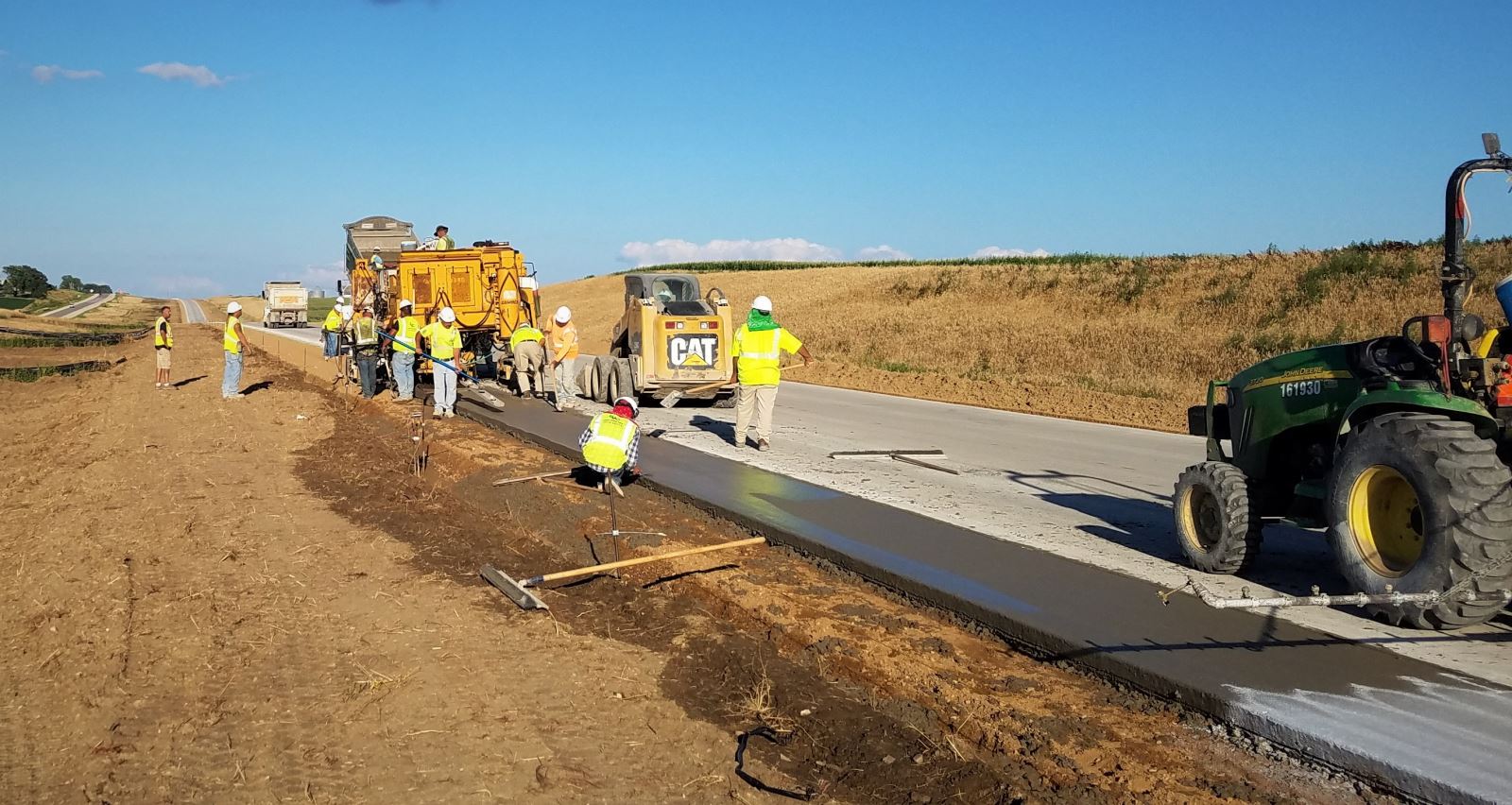 CVC crews placed over 551,901 square yards of concrete paving on this project. This included 43.82 miles of alternate bid concrete shoulders that were four foot wide and six inches in depth. The project included nineteen crossovers that were paved one-half at a time and forty-two turning lanes.
CVC crews placed over 551,901 square yards of concrete paving on this project. This included 43.82 miles of alternate bid concrete shoulders that were four foot wide and six inches in depth. The project included nineteen crossovers that were paved one-half at a time and forty-two turning lanes.
In addition, Cedar Valley was hired by prime contractor, Ames Construction, to trim over 629,000 square yards of earth subgrade. Ames Construction then placed a variable depth granular subbase that averaged almost nine inches thick on the mainline pavement. Construction traffic was prohibited from traveling on the completed granular subbase.
Besides the over 550,000 square yards of paving, this was also a gigantic grading job as over 5,766,000 cubic yards were handled on the project. The grading prime contractor spent the entire 2016 season grading the new eastbound lanes.
That year Cedar Valley only paved about 6,500 square yards of detour paving for a large traffic crossover to be used in 2017 and some shoulder widening.
Just the sheer volume of work being built simultaneously by 3 different contractors on the US 20 corridor during the 2017 and 2018 season overwhelmed the local material producers and material haulers. At times, three different concrete paving plant operations were active at the same time. Naturally all these projects were also clambering for base and shoulder aggregates at the same time as well.
During our early planning stages CVC determined that purchasing a material stacker to start building stockpiles the fall prior to paving would potentially be the only way we could control our own fate. By adding two acres to our plant site we were able to load up our plant site well before paving commenced in 2017. Even with this foresight, our material supplier wasn’t always able to keep up with their local source, so ultimately we were forced to switch to quartzite to finish the 2017 paving.
We repeated the same process in late 2017 as we stockpiled almost 30,000 tons of paving aggregate for 2018 paving. This very proactive move allowed us to maintain excellent production during the entire project. Great relationships and excellent communication enabled CVC to successfully manage this huge material scheduling nightmare.
Resident Construction Engineer Steven McElmeel, PE wrote: This project presented many challenges. This project was a high-profile project for the State of Iowa and had a very aggressive completion date. A project of this type would normally be completed in a minimum of 4 construction seasons and this project was tasked with completion in less than three. --- CVC was able to meet the accelerated schedule of the project without compromising ride quality or durability. --- Meeting the accelerated schedule was especially impressive considering that nearly 38,000 SY of paving was added by Extra Work Order in the summer of 2017, and an additional 3,200 SY was added in the fall of 2018, very late in the project.
Furthermore, Ben T. Lovin, the Midwest Region Vice President for the prime contractor Ames Construction wrote these remarks in a letter sent to Cedar Valley: As you are aware, the combination of late spring starts, abnormally wet weather, compressed schedules and added scope made this project even more challenging. Cedar Valley’s commitment to working together as a team with Ames’ crews and IADOT’s personnel was evident through your ability to modify schedules, dedicate additional crews and accommodate additional work all while providing a first class, quality project.
In the spring of 2017, CVC was invited to participate in the Implementation Assistance Program EL111-2017 -Tools to Improve PCC Pavement Smoothness during Construction (R06E). The Federal Highway Administration had contracted with the National Center for Concrete Pavement Technology through SHARP 2 solutions to conduct this study. We embraced the opportunity to evaluate and understand the value (return on investment) that real time smoothness information provided. We were able to evaluate and understand the impact of specification changes from “zero band” to IRI, based on actual data. We were so impressed with the study results that we decided to purchase a GSI within weeks after the testing for the study had been completed.
Additionally, during the winter of 2017, CVC informally partnered with the Iowa DOT, CP Tech Center, and the FHWA in an effort to provide “real time” availability for PCCP testing. The objective of the Mobile Concrete Trailer visit was to demonstrate innovative technologies currently in the implementation phase. This effort led to CVC hosting the FHWA Mobile Concrete Trailer (MCT) and an open house simultaneously with CVC’s participation in the Performance Engineered Concrete Paving Mixtures pooled fund Project Undertaking both these endeavors has made Cedar Valley Corp. a better contractor.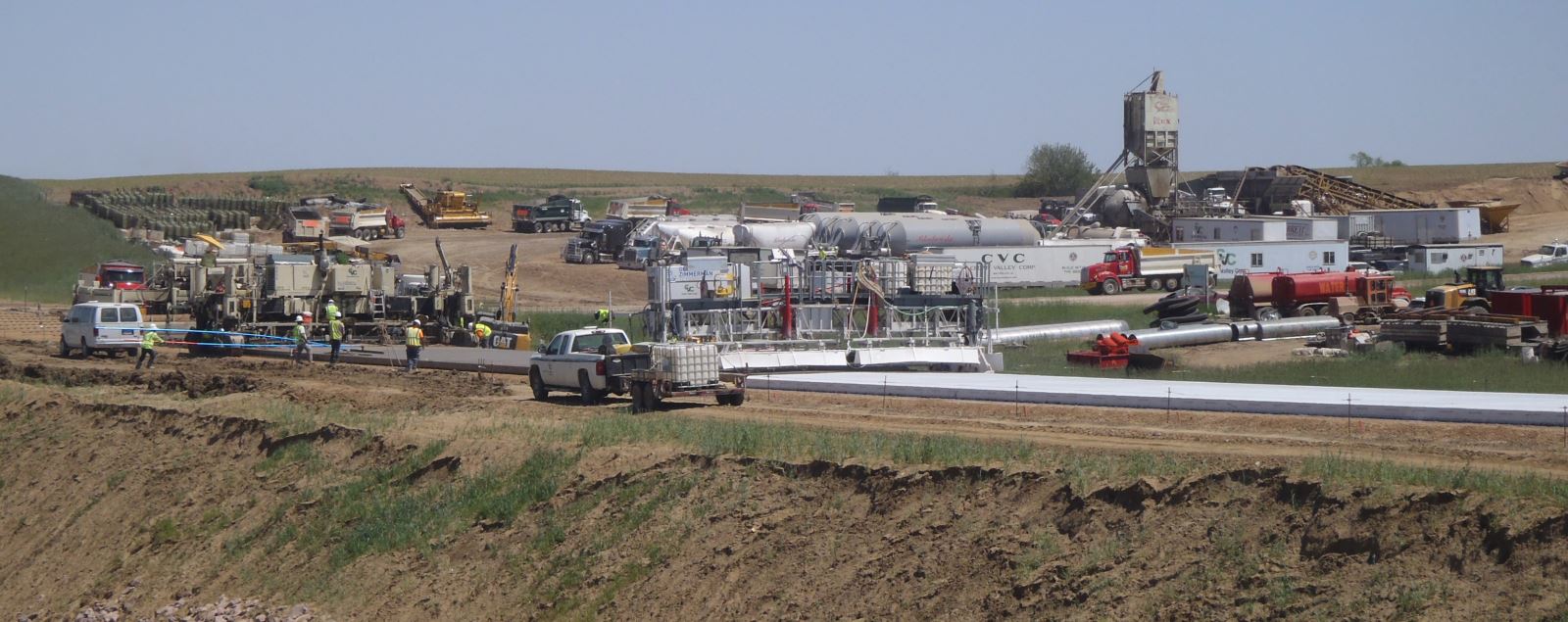
Finally, Cedar Valley is extremely proud of our safety record on this project. We had one loss-time injury and no recordable vehicular accidents with 96,947 man-hours of exposure. CVC also earned an amazing 82 percent of the smoothness bonus and 100 percent of the thickness and mix design bonus.
Project Manager Bob Leon Paving Superintendent Todd Burch
Paving Superintendent Cory Chew Plant Superintendent Brian Ingram
Project Superintendent Craig Silver Plant Foreman Pete Schomaker
Plant Foreman Richard Lee Fine Grade Foreman Dan Zieser
Fine Grade Foreman Barry Beeh Field Office Manager Eric Henry
Concrete Foreman Doug Weber Concrete Foreman Kenny Hoenig
Saw Seal Foreman Gilberto Sanguino Saw Seal Foreman Kandy Fox
Utility Foreman Alan Diaz Equipment Supervisor Bryce Halupnick
Grade Foreman Shawn Beaman Quality Control Supervisor/Truck Fleet Manager John Quandahl
FLOYD COUNTY- T-26 MARBLE ROCK - Silver Award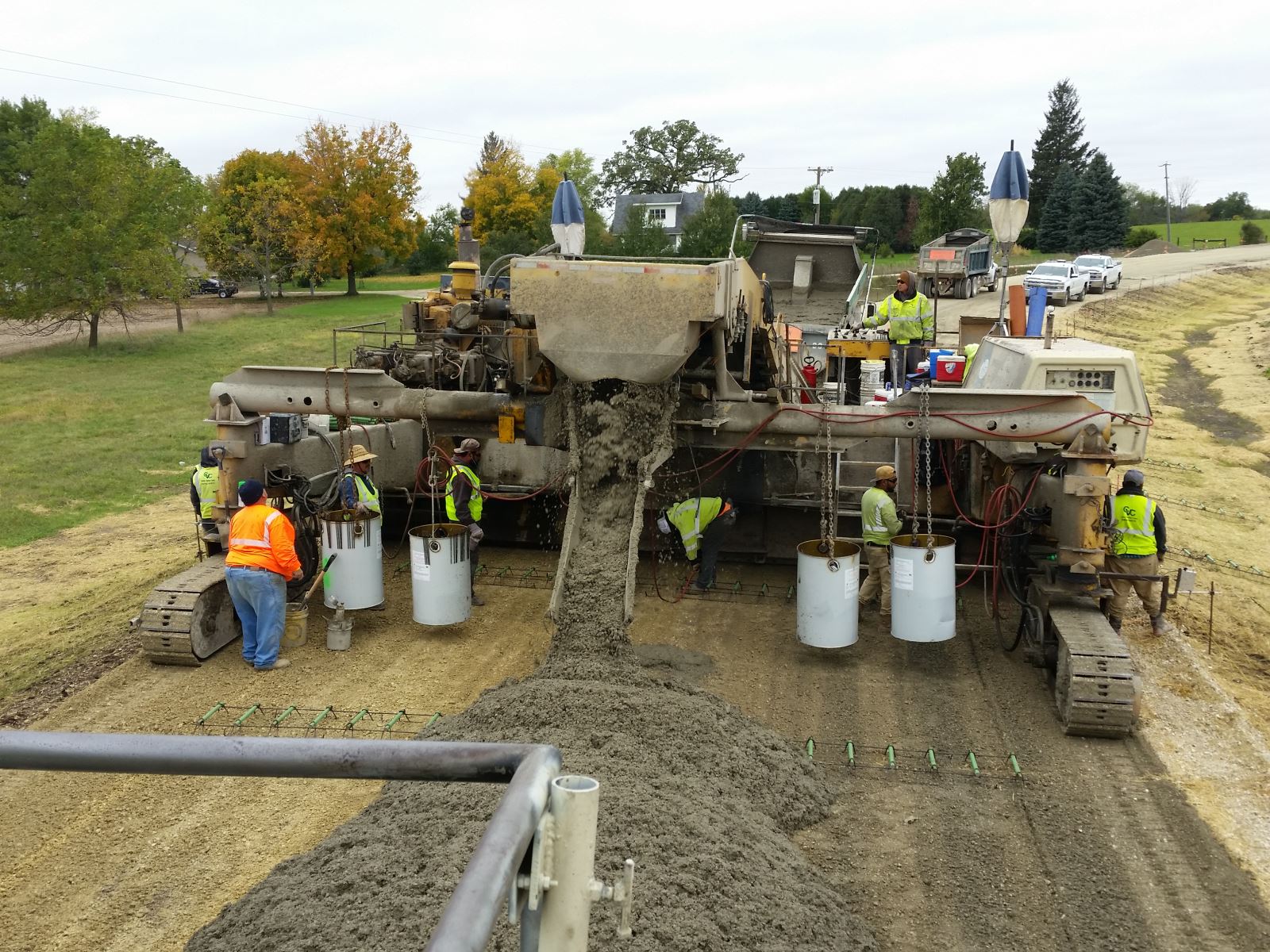
Cedar Valley’s Floyd County–T-26 Marble Rock project won the Iowa Concrete Paving Association’s “Best” County Road PCC Paving project for 2018. Of the seven projects nominated for this award, CVC actually paved three of them – so the odds were somewhat in our favor!
Cedar Valley’s winning project rebuilt 6.05 miles on IA County Road T-26, which covered 78,662 square yards of 8 inch concrete paving. The project contained 52 vertical curves and six horizontal curves. A skewed railroad crossing and the fact that the north end of the project tied into another paved county road impacted the overall smoothness results.
The existing pavement, which consisted of 9 inch thick Type B Class 2 asphalt, was milled and hauled to a nearby asphalt plant location, where the almost 40,000 tons of milled asphalt will be incorporated into future asphalt paving projects. Down the road, this savings will lessen the need for large quantities of virgin material and asphaltic cement on future asphalt projects.
Next, the project was graded to construct a new thirty-two foot platform. The excavation for the base rock was successfully incorporated into project by virtue of widening the proposed shoulders. This eliminated the need to haul material off the project, thus providing fuel savings and also eliminating a potential fugitive dust situation. Type A compaction was used.
During the grading operation substantial unstable areas were discovered. Over forty-one percent of the project required unsuitable subgrade repair as Floyd County wisely chose to remove 17,893 cubic yards of unsuitable material. Next nearly 32,000 square yards of geogrid fabric was placed and the area was filled with 34,000 tons of rock. This became the platform upon which CVC was to pave.
As a final step prior to paving, CVC chose to precut the grade with our dual lane autograde to ensure that there were no high or low spots inadvertently left by our grading subcontractor.
The new roadway was designed to be paved 22 foot wide with 5 foot rock shoulders. Based on the narrow shoulder, CVC chose to place the concrete directly in front of the paving operation by trimming and placing the concrete with one machine. We used an altered CMI dual lane trimmer configured with a dumping belt placed over the machine (aka an Iowa Special). This placement method allowed our crew just enough space to set and place contraction dowel baskets directly in front of the paver, on the freshly trimmed grade immediately prior to the concrete placement. Due to the 22 foot wide paving, CVC’s trimmer/ placer operator electronically manipulated a swinging dump chute to spread out the concrete in front of the paver and over the recently placed baskets. This action enabled us to maintain a consistent head of concrete at our paver.
The CD baskets, along with cure totes and centerline steel, were all hauled out to the project prior to paving and staggered behind the stringline. The CD baskets were pulled onto the grade between the dual lane and the paver using CVC’s innovative hook technique, and nailed down, as previously explained, just prior to concrete placement. This paving process was further complicated because the county specified that contraction dowel bar units be placed on fifteen foot spacing rather than the usual 20 foot spacing. Also, paving without the luxury of shoulder access makes achieving smoothness all the more challenging, as any paver will attest.
Although the actual project was closed to through traffic, local access had to be maintained. The project was built during Iowa’s peak harvest season. As a result, besides the 17 residents who lived on the roadway, Cedar Valley also had to maintain access to forty field driveways. Excellent communication with property owners and use of the maturity concept allowed us to work through the difficulty of maintaining local access and eliminated premature access and damage to the new pavement.
Cedar Valley chose to use the maturity concept as a nondestructive method to determine concrete strength. Every night, after the paving operation ceased, access was immediately reestablished to all affected property owners the minute opening strength had been reached. Public relations received a 5 star rating as well, largely due to this effort.
Obviously opening the roadway to traffic as quickly as possible is the goal of every contractor - and the hope of every impacted property owner. Despite completing almost $628,000 in extra work, Cedar Valley successfully completed this project within the assigned 100 working day period.
Floyd County Engineer Dusten Rolando, P.E. wrote these comments: This project was completed during the busy grain harvest season which was definitely challenging. Throughout a majority of the project we encountered numerous locations of unsuitable subgrade material that was continually stabilized and many days of rain which caused a constant wet grade battle. Maintaining access to adjacent farm fields and residences was a constant battle but was accomplished through great planning and communication among Cedar Valley, our office and local residences. This comradery between everyone helped complete a successful project and provide a truly long lasting pavement.
In most cases the greatest public relations measure a firm can make on a roadway project is to get in, build the job, and get out as quickly as possible. With all the added subgrade repair, the job wasn’t built quickly - but with outstanding communication among all impacted property owners, the all-important public was well pleased. Of equal importance, our crews worked over 11,440 man hours with zero recordable accidents or injuries.
Project Manager Tom Bonner Paving Superintendent Cory Chew
Plant Superintendent Brian Ingram Plant Foreman Richard Lee
Fine Grade Foreman Barry Beeh Quality Control/ SupervisorTruck Fleet Manager John Quandahl
Concrete Foreman Kenny Hoenig Saw Seal Foreman Kandy Fox
Equipment Supervisor Bryce Halupnick Grade Foreman Shawn Beaman